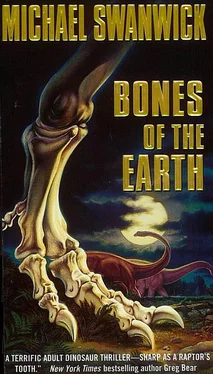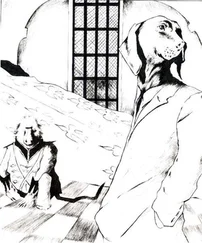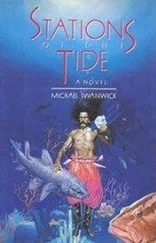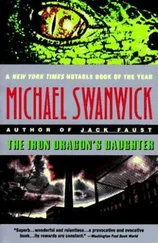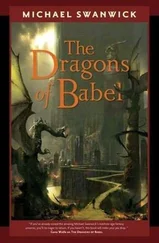“Good question. I don’t know. Here’s another. Where do the dinosaurs go when they’re not here? One day they’re everywhere. Then, a morning later, you wake up and they’re nowhere to be seen. Four months after that, you find a tyrannosaur pacing off the valley, and next thing you know, they’re back. We’re going to have to follow the herds next rainy season. Physically, I mean.”
They’d tried monitoring the migrations over the satellite downlink during the previous winter. But the Ptolemy system was designed primarily for mapping. Its resolution was poor, and, worse, it couldn’t see through clouds. Which were, unfortunately, quite common in the rainy season. They’d been able to track only a general trend inland, where the herds dispersed and effectively disappeared from the screen.
Leyster yearned with all his heart to follow them. In the rainy season only the smaller dinosaurs—the feathered dinosaurs—remained to chastise the frogs, mammals, fish, and lizards. The river plain grew lush and thick as a jungle, but to Leyster it felt empty and soulless without the larger dinos. “We’ll never understand these guys until we understand the patterns of their migration. Finding out has got to be our first order of business.”
“Our second, actually. Chuck says we need veggies, so you’ve been drafted to lead an expedition to gather marsh tubers.”
“Me! Why me? I was going to spend today making twine and re-reading Much Ado About Nothing.‘’ He gestured toward the basket full of fiber and his volume of collected Shakespeare, lying beside the field observations notebook.
Katie smiled sweetly. “You’re the one who found the tubers. Nobody else knows where they are.” She moved the books to her side, and the basket to her lap. “I’ll be happy to take over for you here, however.”
* * *
Leyster recruited Patrick and Tamara to accompany him to Skeeter Marsh. Despite his grousing, he was glad to be going. It wasn’t the lazy, productive day he’d planned, but food gathering was easy work, and entailed a long and pleasant walk through countryside he loved. It was even possible they’d spot something new in dinosaurian behavior.
Since they’d used up their shotgun shells long ago, he and Patrick carried clubs (in Leyster’s case the shovel; in Patrick’s an otherwise-useless gun) to protect themselves against chance attacks from dromaeosaurs. Dromies were the only carnivores so little reliant on smell that they’d attack a human being under normal circumstances. The stench of cookfire smoke that permeated their hair and clothing and skin protected them from pretty much everything else. Except the crocodiles, and those tended to stay by the water.
Tamara, of course, carried her spear. She had spent months during the rainy season laboriously grinding the head from an iron flange that had originally been a piece of bracing for their supplies. Then she had set the leaf-shaped product into a seasoned hardwood haft with a resin glue, and wrapped it tight with hadrosaur tendon.
The result was a murderous-looking weapon they all called “Tamara’s Folly.”
She carried it everywhere and worked on her throwing skills for at least an hour every day. She said it made her feel safe.
Nevertheless, they walked with a caution grown natural through long use. If the past year had taught them nothing else, it was that nothing was to be taken for granted.
As they walked, they talked quietly. This was the one aspect of their stranding that Leyster genuinely appreciated. It was like a never-ending seminar. Being a teacher wasn’t a matter of handing knowledge down from Parnassus to the groundlings below. You learned from your students, from their questions and speculations, and sometimes even their misunderstandings. And this crew was sharp. He’d learned a lot from them.
“Does it seem to anybody else,” Tamara asked, “that there’s an awful lot of biomass tied up in the megafauna here? I mean, not only are there a lot of species in the valley, but there are a lot more individuals than you’d expect.”
“Yeah!” Patrick said. “How can the land support them all? They must be feeding at a startling level of efficiency. They’re constantly chomping down the new growth, and yet they never overgraze. How do they do that?”
“Sometimes small groups leave,” Leyster pointed out. “We’ve seen them do that.”
“Yes, and always just enough to keep things balanced here. That’s spooky,” Tamara said. “How do dim-brained animals like dinosaurs keep those kinds of balances, when real smart animals like human beings can’t?”
“I dunno,” Leyster said.
“Don’t get me wrong,” Tamara said. “But it seems like you say that a lot.”
“Well, if suffering is the essence of the human condition, then the essence of the scientific condition must be ignorance.” Leyster shrugged. “Any ecosystem is a dance of needs, a complex balancing of hungers. When all we had to work with was fossils, what we needed was to find more and better fossils. Now all we have to do is make more and better observations. You guys don’t appreciate how easy you have it.” A mosquito bit him on the arm. He slapped at it and said, “Hey, we’re almost there.”
They dug for tubers until their packs were full and their arms were sore. Then they took a break before heading back. Lying with his head against a log, watching dragonflies noisily mating in the air while Tamara plaited white blossoms into her hair, Leyster decided he was as close to happy as he had ever been.
Tamara and Patrick were lazily, reflexively, arguing about the function of the tyrannosaurs’ tiny little two-fingered arms. Patrick had footage of Her Ladyship fussing over her dried mud mound of a nest and delicately turning over the eggs with them, and felt that settled it. Tamara held that that was only an incidental function, and was convinced that their primary use was as signaling devices for sexual display: I’m ready to mate. Or else: I’m not in the mood.
Leyster was about to weigh in with his own opinion when the phone rang.
“I’ve got it,” Tamara said. She unzipped a pocket on her knapsack, and removed the carefully-swaddled device. Painstakingly, she unwrapped it. Then, walking a little distance away for privacy, she hit the talk button.
Leyster stood. He needed to take a leak. “Back in a minute,” he said.
* * *
When Leyster returned, Patrick and Tamara were grinning ear to ear. “Well,” he said. “Good news?”
“Lai-tsz just made an announcement,” Patrick said. “She was going to wait until tonight when everyone was there, but then somebody said something and she just blurted it out. She’s pregnant.”
“What?! Pregnant? How?”
Patrick snorted and raised a sardonic eyebrow. Tamara looked impatient. “How do you think?”
Leyster sat down on the log. “God, I can’t believe this. Wasn’t she supposed to be on some kind of birth control?” He knew for a fact that she was. He’d seen her medical records. All the women in the party were on long-term birth control, the kind that took medical intervention to undo. “Who’s the fath—?” He stopped. “I’m sorry, that’s a really dumb question.”
“Yes, it is,” Tamara said. “You’re all the father. Everybody’s responsible. We’re all its parents.”
“You don’t sound very happy about the news,” Patrick said carefully.
“Happy? You expect me to be happy? Has anybody given any thought to what kind of life we can provide for this kid?”
“We haven’t had the—”
“With eleven parents, it’s a pretty sure thing she’ll be pampered and spoiled,” Tamara said. “Big deal. Kids are resilient.”
“How about when she hits adolescence?”
Читать дальше
